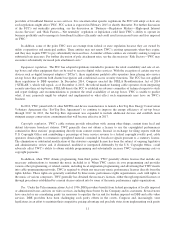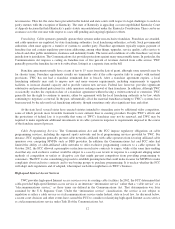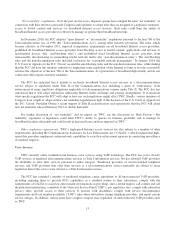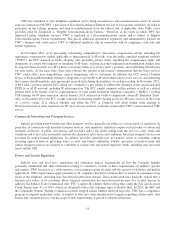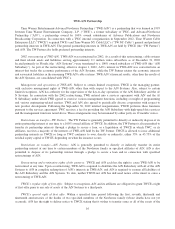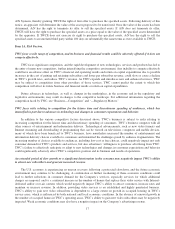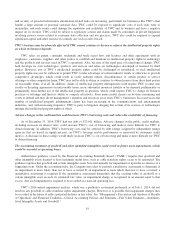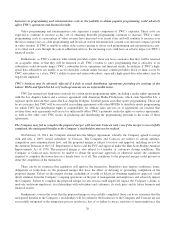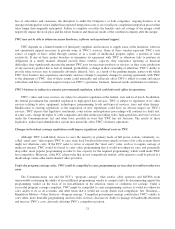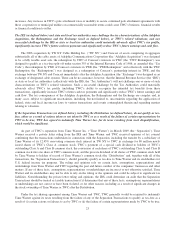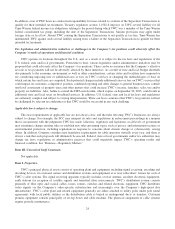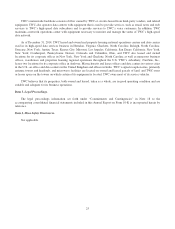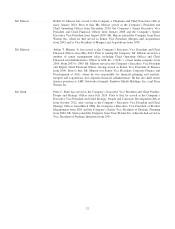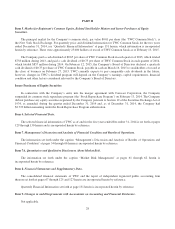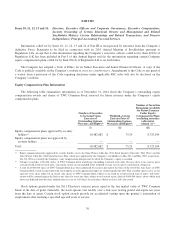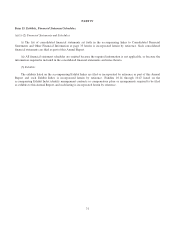Time Warner Cable 2014 Annual Report Download - page 29
Download and view the complete annual report
Please find page 29 of the 2014 Time Warner Cable annual report below. You can navigate through the pages in the report by either clicking on the pages listed below, or by using the keyword search tool below to find specific information within the annual report.loss of subscribers and customers, the disruption to either the Company’s or both companies’ ongoing business or in
unexpected integration issues, higher than expected integration costs or an overall post-completion integration process that
takes longer than originally anticipated. Failure to complete or realize the benefits and cost savings of the merger could
negatively impact the stock price and the future business and financial results of the combined company after the merger.
TWC may not be able to obtain necessary hardware, software and operational support.
TWC depends on a limited number of third-party suppliers and licensors to supply some of the hardware, software
and operational support necessary to provide some of TWC’s services. Some of these vendors represent TWC’s sole
source of supply or have, either through contract or as a result of intellectual property rights, a position of some
exclusivity. If any of these parties breaches or terminates its agreement with TWC or otherwise fails to perform its
obligations in a timely manner, demand exceeds these vendors’ capacity, they experience operating or financial
difficulties, they significantly increase the amount TWC pays for necessary products or services, or they cease production
of any necessary product due to lack of demand, profitability, a change in their ownership or otherwise, TWC’s ability to
provide some services may be materially adversely affected. Also, as a result of the pending merger, parties with which
TWC does business may experience uncertainty and may attempt to negotiate changes to existing agreements with TWC
to the detriment of TWC. Any of these events could materially and adversely affect TWC’s ability to retain and attract
subscribers and have a material negative impact on TWC’s operations, business, financial results and financial condition.
TWC’s business is subject to extensive governmental regulation, which could adversely affect its operations.
TWC’s video and voice services are subject to extensive regulation at the federal, state and local levels. In addition,
the federal government has extended regulation to high-speed data services. TWC is subject to regulation of its video
services relating to rates, equipment, technologies, programming, levels and types of services, taxes and other charges.
Modification to existing regulations or the imposition of new regulations could have an adverse impact on TWC’s
services. TWC expects that legislative enactments, court actions and regulatory proceedings will continue to clarify and,
in some cases, change the rights of cable companies and other entities providing video, high-speed data and voice services
under the Communications Act and other laws, possibly in ways that TWC has not foreseen. The results of these
legislative, judicial and administrative actions may materially affect TWC’s business operations.
Changes in broadcast carriage regulations could impose significant additional costs on TWC.
Although TWC would likely choose to carry the majority of primary feeds of full power stations voluntarily, so-
called “must carry” rules require TWC to carry some local broadcast television signals on some of its cable systems that it
might not otherwise carry. If the FCC seeks to revise or expand the “must carry” rules, such as to require carriage of
multicast streams, TWC would be forced to carry video programming that it would not otherwise carry and potentially
drop other, more popular programming in order to free capacity for the required programming, which could make TWC
less competitive. Moreover, if the FCC adopts rules that are not competitively neutral, cable operators could be placed at a
disadvantage versus other multi-channel video providers.
Under the program carriage rules, TWC could be compelled to carry programming services that it would not otherwise
carry.
The Communications Act and the FCC’s “program carriage” rules restrict cable operators and MVPDs from
unreasonably restraining the ability of an unaffiliated programming vendor to compete fairly by discriminating against the
programming vendor on the basis of its non-affiliation in the selection, terms or conditions for carriage. Under a
successful program carriage complaint, TWC might be compelled to carry programming services it would not otherwise
carry and/or to do so on economic and other terms that it would not accept absent such compulsion. See “Business—
Regulatory Matters—Video Services—Program carriage.” Compelled government carriage could reduce TWC’s ability to
carry other, more desirable programming and non-video services, decrease its ability to manage its bandwidth efficiently
and increase TWC’s costs, adversely affecting TWC’s competitive position.
21


